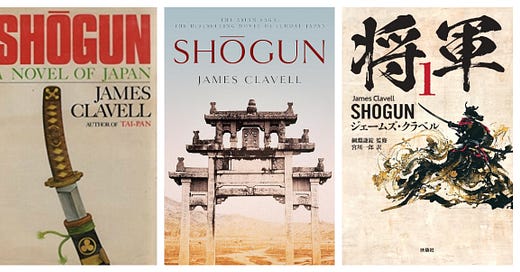Why I Couldn’t Finish Reading James Clavell’s ‘Shōgun’, as a Japanese Person
Sorry but I noticed slight insincerity in this great, best-selling author
Shōgun, released as a television miniseries in 2024, was a remarkable hit, winning multiple Academy Awards. Set in Japan in 1600, the story was previously adapted into a miniseries in the US in 1980, which was also a huge hit and sparked interest in Japanese culture in the West.
These are based on James Clavell's novel.
Since the 2024 version of ‘Shōgun’ became a hot topic, many readers and friends have asked me for my thoughts as a Japanese person. I had already watched both the old and new miniseries and decided to read the original novel, so I purchased an e-book and started reading.
However, I couldn't bring myself to finish it. From the very beginning, I noticed several inaccuracies regarding Japanese culture and even more serious linguistic errors. As I continued reading, my disappointment grew, and eventually I stopped reading the book altogether.
This article is not intended to disparage James Clavell. Instead, it encourages you to think about how we can build a firm cultural bridge between the two countries. As we will see, this is not a fault unique to Clavell but one that can be found in the novels of other famous writers.
Very few Japanese have read the whole story
To begin with, I found it strange that there were almost no reviews of this novel by Japanese people on the Internet.
The original English work was released in 1975. It was translated into Japanese in 1980; the revised edition was published in 2024. However, the new Japanese translation (Volume 1) has only ten reviews on Amazon JP, with an average rating of 3.6 stars. Though the Japanese translator must have corrected linguistic errors, historical or cultural inaccuracies may deter readers.
As far as I can tell from a quick Google search, I haven't found any Japanese person who has read this in English either. Even if some people tried, they may have given up for the same reason I did...
Isn't it interesting that the Japanese effectively rejected this novel, which sold 15 million copies worldwide by 1990? What exactly was the problem? I will share three points that I found particularly problematic as a Japanese person.




